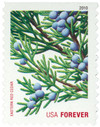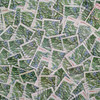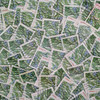
2010 First-Class Forever Stamp, Holiday Evergreens: Eastern
# 4479 - 2010 First-Class Forever Stamp - Holiday Evergreens: Eastern
$0.35 - $14.95
U.S. #4479
2010 44¢ Eastern Red Cedar
Holiday Evergreens
Issue Date: October 21, 2010
City: New York, NY
Printed By: Banknote Corporation of America
Printing Method: Offset, Microprint "USPS"
Color: Multicolored
Dark green and fragrant, the Eastern red cedar tree is a favorite choice in the South for holiday decorating, particularly in the Ozark Mountains of Missouri and Arkansas.
Christmas celebrations were illegal in many areas of the United States for centuries, especially in New England. In Massachusetts, people observing the holiday were subject to fines. Baking traditional mincemeat pies was prohibited in Connecticut.
In the mid-1800s, opinions on the “pagan” holiday relaxed. Germans who had immigrated to the United States introduced the Christmas tree tradition to their new homeland.
Across “the pond,” England’s Prince Albert decorated Windsor Castle’s first Christmas tree in 1841. The German-born husband of Queen Victoria, Albert decorated the tree with candles, fruits, and gingerbread as a reminder of his homeland. Queen Victoria’s subjects soon adopted the custom for themselves.
Germany influenced another English holiday tradition. Since 1947, Norway’s capital city, Oslo, has presented London with a Christmas tree each year. Erected in Trafalgar Square, the gift is an expression of gratitude for Great Britain’s support during World War II, when Germany occupied Norway.
U.S. #4479
2010 44¢ Eastern Red Cedar
Holiday Evergreens
Issue Date: October 21, 2010
City: New York, NY
Printed By: Banknote Corporation of America
Printing Method: Offset, Microprint "USPS"
Color: Multicolored
Dark green and fragrant, the Eastern red cedar tree is a favorite choice in the South for holiday decorating, particularly in the Ozark Mountains of Missouri and Arkansas.
Christmas celebrations were illegal in many areas of the United States for centuries, especially in New England. In Massachusetts, people observing the holiday were subject to fines. Baking traditional mincemeat pies was prohibited in Connecticut.
In the mid-1800s, opinions on the “pagan” holiday relaxed. Germans who had immigrated to the United States introduced the Christmas tree tradition to their new homeland.
Across “the pond,” England’s Prince Albert decorated Windsor Castle’s first Christmas tree in 1841. The German-born husband of Queen Victoria, Albert decorated the tree with candles, fruits, and gingerbread as a reminder of his homeland. Queen Victoria’s subjects soon adopted the custom for themselves.
Germany influenced another English holiday tradition. Since 1947, Norway’s capital city, Oslo, has presented London with a Christmas tree each year. Erected in Trafalgar Square, the gift is an expression of gratitude for Great Britain’s support during World War II, when Germany occupied Norway.












